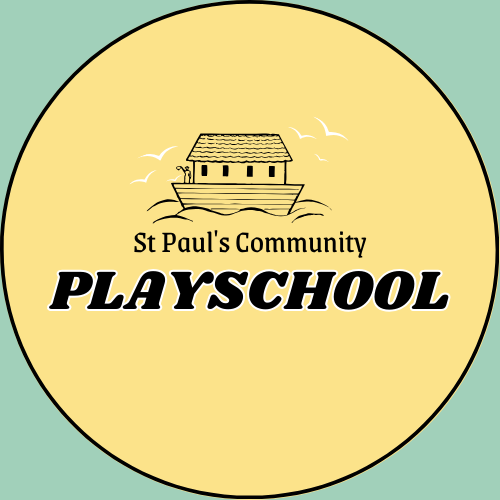Daily Routine & Session Times
Playschool core hours are 9.30am – 12 noon daily (term-time only). There is also the option of extending session times to include set-up club 9-9.30am and/or lunch club 12-1pm.
Daily routine provides children with a sense of security and reassurance whilst a choice of activities allows them independence.
Once everyone has arrived, we gather together for our morning welcome songs which can include days of the week, weather and hello songs. We also reinforce our ‘golden rules’ and share any news.
Children have free play throughout the morning with free-flow between the inside and outside areas. Play opportunities and activities allow children to explore the different areas of learning within the Early Years Foundation Stage. These include the book corner, home corner, dressing up, playdough, painting, small world, construction toys, trampoline, trikes and scooters. There is also an adult led activity linked to our theme of the week.
We have a rolling snack mid morning where children are offered a variety of fruit and vegetables and milk or water.
Towards the end of the morning children are encouraged to help tidy up before gathering together to choose a book. We have a short group time and engage in activities such as singing, action rhymes, dancing, music and story time.
We end the morning with our goodbye song.
Parents and carers have the opportunity to meet with their child’s key person once a term to share their Learning Journal and discuss their child’s progress and development. Playschool staff are available on a daily basis to address any day to day concerns.
Children in the Early Years have a need to explore, discover and have new experiences and we love to provide an environment of exploration and learning at the playschool.
“Play is often talked about as if it were a relief from serious learning. But for children play is serious learning. Play is really the work of childhood.”
Fred Rogers
What we do at Playschool
Playschool follows the Early Years Foundation Stage (EYFS) Statutory Framework, which sets standards for the learning, development and care of children from birth to 5 years old. In addition to supporting children’s communication and language skills, physical development and personal, social and emotional development, we strive to create a play-based environment which stimulates children’s natural curiosity and love of learning. As children develop and show their natural interests, we help them to investigate maths, literacy, artistic expression and the world through their favourite topics.
-
Children learn to:
express themselves in different ways
communicate using words, speaking in sentences
be confident to talk to others
say their name
listen to others
talk about past, present and future events
follow instructions
sing songs
enjoy books and stories
-
Children learn to:
separate from their carer on arrival
be confident to approach their key person or another adult for help
share and take turns
be polite, kind and caring towards others
follow daily routines
be confident, independent learners
make friends
express and manage their emotions
take part in group activities
be emotionally ready for transition to school nursery class or reception
-
Children learn to:
get to know and understand their bodies
eat and drink independently making healthy food and drink choices
use the potty/toilet
wash and dry their hands
take off and put on their coat and shoes
develop gross motor skills, running, jumping, climbing, balancing
develop fine motor skills, mark making with a variety of tools
-
Children learn to:
know their name and recognise it in print
be aware of print in the environment
choose books and look at them independently
listen to stories and tell stories
join in with nursery rhymes and singing songs
-
Children learn to:
count up to and beyond 10
recognise and name shapes
recognise numerals
match number and quantity
be problem solvers
complete jigsaw puzzles
understand mathematical concepts
compare and contrast; bigger/smaller, heavier/lighter
-
Children learn to:
understand the world around them
take care of the natural environment
appreciate nature and God’s creation
operate technology
know their place in their family and community
talk about their family celebrations
understand the different roles people have
-
Children learn to:
be curious and imaginative
make believe and pretend
dress up and engage in imaginative role play
play musical instruments
sing and dance
build and create
be creative, drawing, painting, cutting, sticking
name colours and mix colours
Children Play and Explore, participating in new experiences
and developing their own preferences
Children are Active Learners, learning through play and making
independent choices. They develop concentration.
Children are Creative and Critical Thinkers, developing problem solving skills.
They have their own ideas and learn to negotiate with others.
Our continuous provision allows for learning opportunities across all seven areas of learning.
We introduce new themes and topics, introducing children to new ideas and experiences building their cultural capital.
We recognise children are individuals and find out what their interests are. We create the right environment for them to learn, recognising their abilities and skills, helping them build their interests playing and exploring.
We create a safe environment where each child can be happy and enjoy themselves.
We reinforce our ‘golden rules’.
We observe children at play, planning their next steps for progress.
We allow children to make independent choices at free play.
We provide adult initiated and adult led activities.
We provide routine; morning welcome, snack time, free flow play inside and outside, tidy up time, group circle time with story telling, singing and dancing.
We want every session to be a positive experience.
We meet regularly to discuss children’s progress.
We partner with parents, recognising that they are children’s primary educators and know them best.
We communicate regularly with parents; newsletters, emails, meetings, online learning journal.
What parents say:
“The children are happy and settled.”
“My daughter’s confidence has grown so much.”
“It’s been so beneficial to his development.”
“I can see how much progress she has made.”
“Good service being provided as evidenced by my child’s improvements.”

